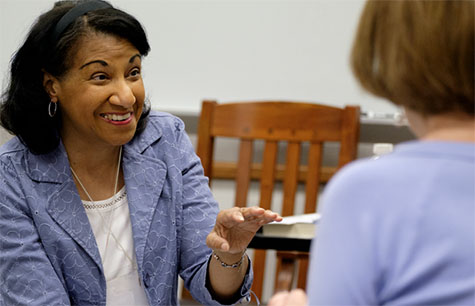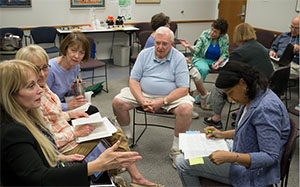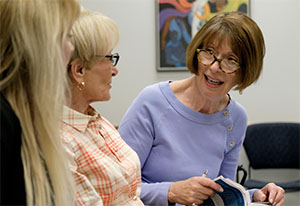
Karen Sterbenz, a veteran member of the Lifelong Learning Institute of Washington University in St. Louis, laughs when she recalls the student who quit because he would not be graded. What good, he wondered, is learning if you don’t get that gold star?
“We love that there are no tests and no papers, but I guess he missed having homework,” Sterbenz said. “We enjoy the camaraderie of being part of a learning community without the competition that often comes with being part of a learning community.”
This year, the Lifelong Learning Institute is celebrating its 20th anniversary of educating senior adults. Robert Wiltenburg, PhD, who stepped down as dean of University College this summer, recently told a gathering of students that the institute is his favorite academic program “because the students don’t need grades, the faculty don’t get tenure and the parents never call.”
“It’s a joke of course, but, like any joke with staying power, it gets at something true and important as well,” Wiltenburg said. “Here, we are all on the same level field. Though one may know a little more about some subject than another, we are here on terms of a radical equality unseen since, say, your co-op nursery school, and the rewards for each one’s enthusiasm and labor are the simple, equal joys of learning and sharing.”

Since its founding, the program has served some 2,000 students from across the region and has offered hundreds of classes – 134 this year alone.
All courses are led by the students themselves or, in institute lingo, “facilitators.”
Sterbenz is one of the best. On this day, she’s co-facilitating “Best American Short Stories 2014,” but she also has led classes on Canada, one-act plays, St. Louis neighborhoods, the Pritzker Architecture Prize and many other topics. She joined the program 19 years ago when she saw a brochure for the institute at Whittemore House.
“I said to my husband, ‘Look at this. It says you have to be 55. I just turned 55. We could do this,’ ” Sterbenz recalled. “We decided our strategy would be to take one class together and one apart. I took ‘Art of Our Times,’ he took ‘Great Decisions’ and we took ‘St. Louis History’ together.
“That worked for two terms, and then we went our separate ways and picked our own classes. Now my husband (former university human resources adjunct instructor Butch Sterbenz) is facilitating his own classes.”
Sterbenz’ co-facilitator is Brenda Lambert, who only joined the institute a year ago. Originally from St. Louis, Lambert worked in the insurance industry in California before returning home to care for her 94-year old mother. She took community college classes, but prefers the institute’s model of peer learning.
“When you are a caregiver, you need something just for yourself,” Lambert said. “When I come here, I can be me.”
One of Lambert’s first classes was “Best American Short Stories 2013” with Sterbenz. When she eagerly offered to prepare a presentation on one of the authors, Sterbenz knew she would make a great facilitator.
“That made her a marked woman,” Sterbenz said, laughing. “You don’t have to be credentialed — we have a pediatrician who taught Shakespeare for years — but you do have to do the research and know how to create a welcoming environment.”
Catherine “Katie” Compton, director of the Lifelong Learning Institute, said many universities host learning programs for senior adults, but few boast such a robust corp of volunteers.

“Eventually (other universities) have to hire instructors because they can’t find enough volunteers to facilitate classes,” Compton said. “That has never been an issue here.
“I am amazed by the courses our facilitators develop,” she said. “They bring their passion but also a rigor to the subjects they teach. There is some great learning happening here.”
Like all institute classes, “Best American Short Stories” meets on Washington University’s West Campus, where students have access to nearby covered parking.
The students mingle over coffee and a platter of chocolate chip and oatmeal raisin cookies before the facilitators break the class of 14 into small groups to discuss Peter Cameron’s, “After the Flood.”
Judie Courtney, a retired senior vice president of the Federal Reserve Bank, considers the protagonist’s relationship with her faith, while Nina Kaplan, a former psychotherapist, breaks down the title’s symbolism.
“There is the actual flood but then there is the emotional flood here,” Kaplan said. “We’re talking about trauma.”
The small groups converge and break apart again in different configurations to discuss other titles. Two hours later, Sterbenz has to close the conversation.
“I know there’s still more to talk about, but think of this class as an introduction to many hours of contemplation,” Sterbenz said. “It’s not a task completed; it’s a task begun.
“That’s how I think about education.”